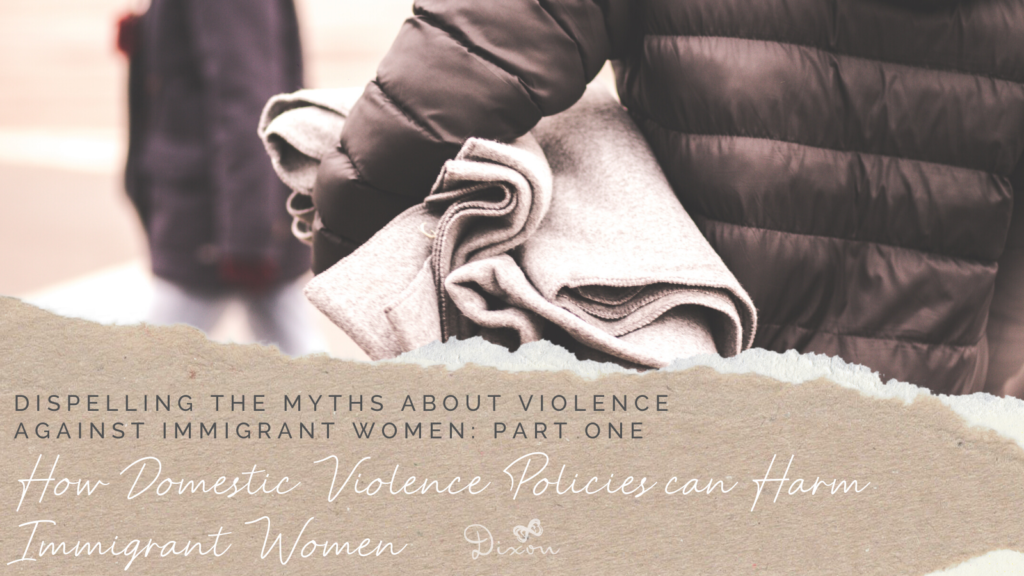
Have you ever heard someone say, “It’s immigrants from ‘backwards’ places that are bringing domestic violence into Canada?” Have you ever found yourself thinking that “If we can just find a way to educate immigrants, then we can help keep women safe from violence?” Ideas like this are rooted in myths about immigrant populations and violence against women: in reality, it’s a lot more complicated.
There are unique structural and social forces influencing a woman’s experiences of violence. Things like laws, cultural biases and socioeconomic factors can affect a woman’s situation. Moreover, these things can affect different women differently. For example, the high cost of housing in Vancouver may serve as a greater barrier to leaving an abusive partner to a woman making minimum wage as opposed to a woman earning six figures.
Immigrant women face a lot of unique challenges when experiencing violence because of the way societal forces interact with their unique position. Some of the most impactful forces affecting immigrant women today are Canadian domestic violence and immigration policies.
Why is Policy Important?
Policies define the situation.
Policies shape what sort of support women can access when seeking help, and define important aspects of their experiences. For example, what counts as “acceptable evidence” of experiencing abuse? What is a “sponsored spouse” and what sort of citizenship rights does that entail? Answers to questions like these are central to immigrant women’s experiences of domestic violence. Public policies define these answers.
Policies of the past can come back to haunt women.
Past policies also have important effects on immigrant women’s experiences of violence. Policies can reflect or reaffirm social norms, and new ones are often built off of old ones.
For example, Canada’s immigration policy used to distinguish between “preferred immigrant” and “non-preferred immigrant” countries. Immigration from “non-preferred” countries was often restricted according to economic needs, and non-white immigrants were the most exploited. This practice helped create a racial hierarchy that helped normalize racist ideologies. Needless to say, this legacy can still affect immigrant women of colour today. Racism and xenophobia in the job market can affect a woman’s ability to obtain a well-paying or flexible job, potentially hindering her ability to leave a violent situation.

How do Domestic Violence Policies affect the Lives of Immigrant Women Experiencing Violence?
Domestic Violence Policies mostly focus on Criminal Responses and not Social Prevention.
Domestic Violence can be understood as a criminal, health, and social problem. While we see all perspectives reflected in Canadian policy, the criminal view tends to take the lead.
The criminal approach has many benefits. Identifying domestic violence as a criminal offence acknowledges it as a problem worthy of government intervention. Moreover, when we define domestic violence as a crime, we are able to immediately respond to a woman’s request for help and offer her some protection.
The criminal view, however, is not without its flaws. Criminal views of domestic violence tend to distract from social and economic influences on domestic violence experiences. This can shift attention away from predictive indicators of domestic violence. While there is no excuse for violence, it is important to note that some social factors may make some women more vulnerable to violence.
For example, the stereotype that criminals are “just bad people” might take attention away from unemployment in the family. Financial hardship increases the likelihood of domestic violence and can be mediated by social policies. In over-emphasizing the role of criminality in domestic violence, we’ve focused on responding to violence, rather than preventing it.

Immigration and Domestic Violence Policies don’t “talk” to each other.
Simply put, Canada’s current model of domestic violence fails to account for the unique needs of immigrant women. It is often said that everyone is equal before the law. Sadly, it is far from the truth to say that everyone’s path to justice is paved the same way.
Laws outline specific responses to domestic violence, but they often do not consider the unique vulnerabilities a woman might have. Most female immigrants enter Canada as sponsored spouses, placing them in a state of dependence from the beginning. Immigration laws require sponsored spouses to live with their partner for two years. This might make some women hesitant to seek help, as many communities have laws making the removal of an abusive spouse from the home mandatory. As a result, some women might be hesitant to seek help out of fear that it will jeopardize their immigration plans.
Some jurisdictions also have laws restricting sponsored individuals’ access to publicly-funded social services. These restrictions can also make it difficult for newcomer women to leave, as they deprive women of support.
So what can I take away from this?
The interplay of immigration and domestic violence policies has profound effects on the lives of immigrant women experiencing violence today. Over time, domestic violence policies have become unresponsive to the needs of their unique situations. Instead, these policies enforce a ‘one-size-fits-all’ set of solutions that simply isn’t compatible with many women’s lived experiences. Often, Canadian policies themselves are making life harder for immigrant women experiencing violence.
In a future blog post, we’ll be taking a deep dive into how Canadian immigration policy today works. We’ll be taking a look at what avenues immigrant women experiencing violence can take to get help, and how they might serve as a barrier to women fleeing domestic violence.
If you are currently living in a violent situation in the lower mainland, Dixon is here 24/7 at 604-298-3454. For services outside of the Lower Mainland, please contact VictimLinkBC at 1-800-563-0808.
If you or your loved ones are in immediate danger, please call 911.
